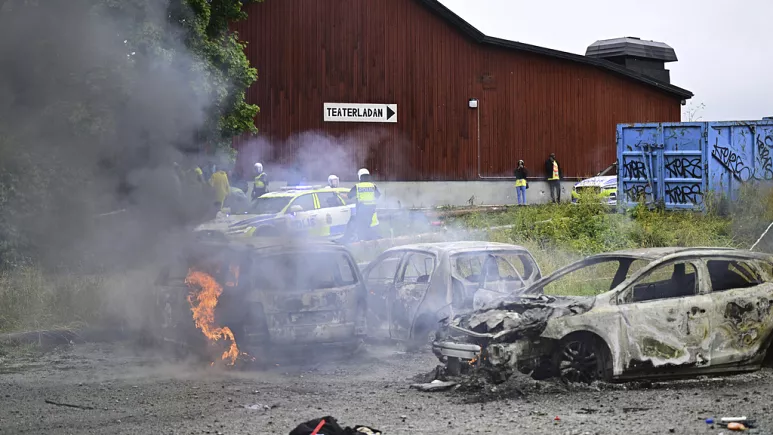An Eritrea-themed cultural festival in a suburb of Stockholm took a violent turn on Thursday as a large group of anti-Eritrean government protesters stormed the event, resulting in at least 52 people injured, according to Swedish media reports.
The protesters, estimated to be around a thousand in number, set booths and vehicles ablaze, causing thick plumes of smoke to rise into the sky. Swedish newspaper, Expressen, stated that the protesters marched towards the festival grounds, defying police cordons and wielding sticks and rocks as weapons.
Swedish police spokesperson, Daniel Wikdahl, reported that “between 100 and 200 people have been detained.” A significant police presence remains at the scene, and investigations are currently underway, he added.
Sweden is home to a significant number of individuals with Eritrean roots. The annual festival, dedicated to celebrating Eritrea’s cultural heritage, has been held since the 1990s. However, it has garnered criticism for allegedly being used as a promotional tool and a source of funding for the Eritrean government, as per Swedish media sources.
Protester Michael Kobrab expressed his views to Swedish broadcaster TV4, stating, “This is not a festival, they are teaching their children hate speech.”
Eritrea has long been regarded by human rights organizations as one of the world’s most repressive countries. Since gaining independence from Ethiopia three decades ago, the small nation in the Horn of Africa has been under the leadership of President Isaias Afwerki, who has yet to hold an election.
Despite these criticisms, the festival has been a prominent event within the Eritrean diaspora community in Sweden. It has historically provided a platform for individuals to celebrate their cultural roots, showcasing traditional music, dance, and cuisine.
The violent turn of events has drawn attention to the deep political divisions within the Eritrean community in Sweden. While some individuals were protesting against the alleged support for the Eritrean government, others attended the festival seeking to celebrate their heritage and connect with their fellow community members.
Swedish authorities have long attempted to strike a balance between upholding the right to freedom of expression and maintaining public safety. In recent years, tensions between pro-Eritrean and anti-Eritrean government groups have escalated within Sweden’s Eritrean community, leading to sporadic clashes during various events.
The Eritrean government has yet to comment on the incident, but it is likely to face increased scrutiny and criticism from human rights organizations following the violence at the festival.
As investigations continue, Swedish authorities are expected to take further measures to prevent similar incidents from occurring in the future. However, finding a solution to the political divisions within the Eritrean community may prove to be a more complex and challenging task.
The Eritrea-themed festival in Stockholm will undoubtedly be remembered for the violence that erupted, further highlighting the need for constructive dialogue and understanding within the Eritrean diaspora community and beyond.
Image Credit: Magnus Lejhall/TT News Agency/AP





